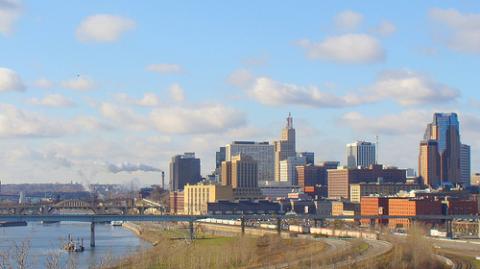Updated November 2016
Minneapolis, with its wide boulevards, organized grid layout, and modern downtown, stands in striking contrast to the city of St. Paul across the river, with its late-Victorian architecture, narrower streets, and irregularly shaped neighborhoods. While the Twin Cities have a long history of rivalry and differ in appearance, together they are home to many community wealth building initiatives and organizations.
According to the U.S. Census Bureau's 2015 estimates, the Twin Cities are home to nearly 711,800 people, with Minneapolis' population exceeding St. Paul’s by about 100,000. While both cities suffered population declines that peaked in the 1970s, St. Paul and Minneapolis have experienced a wave new development in recent years, growing by 6 and 7 percent, respectively, between 2010 and 2015.
Traditionally, Minneapolis had a large Scandinavian community, while Irish and German immigrants were more prominent in St. Paul. In the 1990s, a new wave of immigrants arrived from Mexico, Southeast Asia, and sub-Saharan Africa, making the Twin Cities home to the largest Somali population in the United States. Today, both cities are roughly two-thirds white American (60 percent in St. Paul and 64 percent in Minneapolis), while African Americans make up roughly a sixth of the population (16 percent in St. Paul and 19 percent in Minneapolis). Approximately a tenth of the population is Hispanic American in both cities, while the presence of Asian Americans is significantly higher in St. Paul (15 percent versus 6 percent).
With both Minneapolis and St. Paul having rebounded in recent years, affordable housing has become a prominent issue. As one of the nation's most racially segregated urban areas, a disproportionate number of people of color have been unable to keep up with rising property values. In response, two community land trusts within the Twin Cities, City of Lakes CLT and Rondo CLT, are working to keep housing within the region permanently affordable for generations to come. Rondo’s approach is especially unique: in addition to constructing new homes, the CLT creates affordable housing by moving buildings slated for demolition to vacant lots and then rehabbing them, an effort credited with creating 15 housing units and diverting over 15 million pounds of waste from landfills.
The Twin Cities are also home to numerous CDCs, such as East Side Neighborhood Development Company, which works to generate wealth and maintain diversity within the community and consciously strives to ensure the majority of homes, jobs, and businesses it supports are available to and operated by people of color. In 2015 alone, the CDC rehabbed 40 homes, developed 10 new homes, and completed several capital improvement projects—developments which brought over $7 million in new housing and economic development to the area. CDFIs are also playing an important role in community wealth building, especially among communities of color. For example, since 2004, the African Development Center (ADC), which seeks to grow businesses, build wealth, and increase reinvestment in Minnesota’s African communities, has lent more than $6 million to small businesses and entrepreneurs, leveraging more than $12 million in small business investment and creating or retaining over 1,000 jobs.
Another especially innovative nonprofit is Nexus Community Partners. Founded in 2004, Nexus works across the Twin Cities region to build more engaged and powerful communities of color by supporting community-building initiatives that expand community assets and foster social and human capital.
An overview of these and other community wealth building efforts follows:

